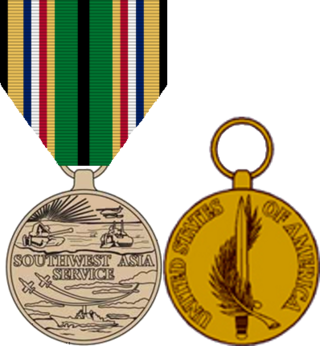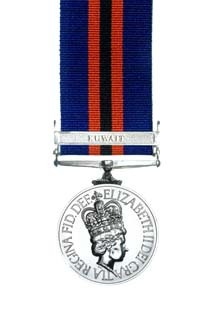Related Research Articles

The Kuwait Armed Forces are the military forces of the State of Kuwait. They consist of the Kuwait Air Force, the Kuwait Army, the Kuwait Navy & the Kuwait National Guard. The governing bodies are the Kuwait Ministry of Defense, the Kuwait Ministry of Interior, and the Kuwait Fire Service Directorate. The Emir of Kuwait is the commander-in-chief of all defense forces while the Crown Prince is the deputy commander.

The Gulf War was an armed conflict between Iraq and a 42-country coalition led by the United States. The coalition's efforts against Iraq were carried out in two key phases: Operation Desert Shield, which marked the military buildup from August 1990 to January 1991; and Operation Desert Storm, which began with the aerial bombing campaign against Iraq on 17 January 1991 and came to a close with the American-led liberation of Kuwait on 28 February 1991.

Operation Granby, commonly abbreviated Op Granby, was the code name given to the British military operations during the 1991 Gulf War. 53,462 members of the British Armed Forces were deployed during the conflict. Forty-seven British personnel were killed during Op Granby and many more were injured during the hostilities there. The total cost of operations was £2.434 billion (1992), of which at least £2.049 billion was paid for by other nations such as Kuwait and Saudi Arabia; £200 million of equipment was lost or written off.

The United States Central Command is one of the eleven unified combatant commands of the U.S. Department of Defense. It was established in 1983, taking over the previous responsibilities of the Rapid Deployment Joint Task Force (RDJTF).

The Southwest Asia Service Medal is a military award of the United States Armed Forces which was created by order of President George H.W. Bush on March 12, 1991. The award is intended to recognize those military service members who performed duty as part of the Persian Gulf War and for a time thereafter. The medal was designed by Nadine Russell of the Army's Institute of Heraldry. The colors of the ribbon are tan, representing sand, with the black, white, red, blue, and green colors symbolizing the colors of coalition countries' national flags.

The Battle of Khafji was the first major ground engagement of the Gulf War. It took place in and around the Saudi Arabian city of Khafji, from 29 January to 1 February 1991.

The Gulf War oil spill, or the "Persian Gulf oil spill", was one of the largest oil spills in history, resulting from the Gulf War in 1991. In January 1991, Iraqi forces allegedly began dumping oil into the Persian Gulf to stop a U.S. coalition-led water landing on their shores. Despite quite high initial estimates, the spill likely was about 4,000,000 US barrels. Within the following months of the spill, most clean-up was targeted at recovering oil, and very little clean-up was done on Saudi Arabia’s highly-affected beaches. An initial study in 1993 found that the spill will not have long-term environmental consequences, but many studies since 1991 have concluded the opposite, claiming that the spill is responsible for environmental damage to coastline sediments and marine species and ecosystems. Considered an act of environmental terrorism, the spill was a heated political move that had implications for the larger Gulf War and temporarily damaged Kuwait and Saudi Arabia.

The Iraqi invasion of Kuwait began on 2 August 1990 and marked the beginning of the Gulf War. After defeating the State of Kuwait on 4 August 1990, Iraq went on to militarily occupy the country for the next seven months. The invasion was condemned internationally, and the United Nations Security Council (UNSC) adopted numerous resolutions urging Iraq to withdraw from Kuwaiti territory. The Iraqi military, however, continued to occupy Kuwait and defied all orders by the UNSC. After initially establishing the "Republic of Kuwait" as a puppet state, Iraq annexed the entire country on 28 August 1990; northern Kuwait became the Saddamiyat al-Mitla' District and was merged into the existing Basra Governorate, while southern Kuwait was carved out as the all-new Kuwait Governorate. By November 1990, the adoption of UNSC Resolution 678 officially issued Iraq an ultimatum to withdraw unconditionally by 15 January 1991 or else be removed by "all necessary means" from Kuwaiti territory. In anticipation of a war with Iraq, the UNSC authorized the assembly of an American-led military coalition.

Muhammad Hussein Tantawi Soliman was an Egyptian field marshal and politician. He was the commander-in-chief of the Egyptian Armed Forces and, as chairman of the Supreme Council of the Armed Forces, was the de facto head of state from the ousting of President Hosni Mubarak on 11 February 2011 until the inauguration of Mohamed Morsi as president of Egypt on 30 June 2012.

The Kuwait Liberation Medal is a medal created in 1994 that was issued by the government of Kuwait to both local and foreign military personnel who served in the Gulf War's "Liberation of Kuwait" campaign phase of 1990 and 31 August 1993.

The Naut Tahrir al-Kuwait was instituted by King Fahd ibn Abdulaziz of Saudi Arabia for service during the Liberation of Kuwait campaign.

Opération Daguet was the codename for French operations during the 1991 Gulf War. 18,000 members of the French Armed Forces were deployed during the conflict and they represented the second largest European contingent. Operating on the left flank of the US XVIII Airborne Corps, the ground component of the French force, named Division Daguet, was formed in September 1990 in Saudi Arabia as part of France's contribution to Operation Desert Shield. France also deployed several combat aircraft and naval units. Opération Daguet was commanded by Army general Michel Roquejeoffre.

The Gulf War Medal was a campaign medal approved in 1992, for issue to officers and men of British forces who served in Kuwait and Saudi Arabia during Operation Granby in 1990–91.

The New Zealand General Service Medal 1992 (Warlike) (NZGSM 1992) is a New Zealand campaign medal, authorised in 1992, for award to New Zealanders who have served in warlike operations for which no separate New Zealand or British Commonwealth campaign medal was issued.

The General Service Medal, is a campaign medal of the United Kingdom introduced in 1962 to replace both the General Service Medal (1918), as awarded to the Army and RAF, and the Naval General Service Medal (1915). The 1962 GSM was awarded until 2007, when it was replaced by the Operational Service Medal. In 2015 the General Service Medal (2008) was introduced.

The Iraq Medal was instituted by Queen Elizabeth II, Queen of Australia on the advice of the Australian Prime Minister John Howard in 2004. The Iraq Medal is awarded to Australian Defence Force (ADF) personnel who served in or around Iraq during the Iraq War. ADF personnel are also recognised by the 'IRAQ 2003' clasp to the Australian Active Service Medal.

On 29 November 1990, the adoption of United Nations Security Council Resolution 678 authorized the assembly of a multinational military coalition to fight against Iraq in the Gulf War. The coalition's purpose was to liberate Iraqi-occupied Kuwait by "all necessary means" if Iraq did not withdraw by 15 January 1991. Iraq failed to relinquish control over Kuwait by the deadline specified in Resolution 678, leading to the commencement of combat operations with the Gulf War aerial bombardment campaign on 17 January 1991. At this time, the coalition consisted of 42 countries and was spearheaded by the United States: the central command was led by the United States, Saudi Arabia, and the United Kingdom; the marine command was led by the United States; the Joint Forces East Command was led by Egypt, Saudi Arabia, Syria, Morocco, Kuwait, Oman, the United Arab Emirates, Qatar, Bahrain, Poland, and Czechoslovakia; and the Joint Forces North Command was led by the United States, the United Kingdom, France, Canada, Italy, Australia, Japan, and Turkey. On 23 February 1991, the aerial bombardment campaign came to an end as the coalition began a large-scale ground offensive into Iraqi-occupied Kuwait and parts of Iraq. The Iraqi military was devastated in the fighting, and Kuwait was declared completely free of occupying Iraqi troops on 28 February 1991.
Pakistan Armed Forces deployments include all Pakistani military deployments that are stationed outside Pakistan and serving in other countries. The sixth largest military power in terms of active troops, Pakistan has an extensive history of overseas military presence, especially in the Middle East, where it has maintained military contingents, missions and battalions in several states. As part of its foreign policy efforts to expand its military relations and influence in the region, Pakistan signed defence protocols during the 1970s with several Arab countries including Saudi Arabia, Libya, Jordan, Iraq, Oman, the United Arab Emirates and Kuwait, under which members of the armed forces of these countries were imparted professional training by Pakistani advisers and military trainers. Saudi Arabia signed a bilateral agreement with Pakistan on defense cooperation; during that time, there were 50,000 to 60,000 Pakistani military personnel serving abroad with the largest number of these, about 20,000, deployed in Saudi Arabia.
The timeline of the Gulf War details the dates of the major events of the 1990–1991 war. It began with the Iraqi invasion of Kuwait on 2 August 1990 and ended with the Liberation of Kuwait by Coalition forces. Iraq subsequently agreed to the United Nations' demands on 28 February 1991. The ground war officially concluded with the signing of the armistice on 11 April 1991. However, the official end to Operation Desert Storm did not occur until sometime between 1996 - 1998. Major events in the aftermath include anti-Saddam Hussein uprisings in Iraq, massacres against the Kurds by the regime, Iraq formally recognizing the sovereignty of Kuwait in 1994, and eventually ending its cooperation with the United Nations Special Commission in 1998.